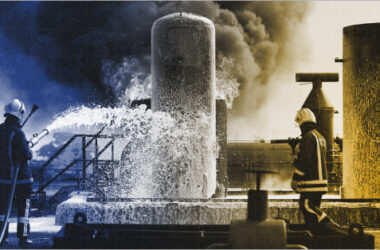Fire – a devastating force with the potential to cripple businesses and wipe out years of hard work. While Fire Insurance offers a layer of financial protection, understanding the specifics of your policy is crucial. One critical term in any business Fire Insurance Policy in India is ‘Direct Cause of Loss’. This seemingly simple phrase can have significant implications for your claim payout in the unfortunate event of a fire.
In this blog post, we will seek to decipher the meaning of ‘Direct Cause of Loss’ in Fire Insurance India policies for businesses. We will also explore how this term can impact your claim settlement so that you will be better equipped to navigate the claims process.
Here we go!
Understanding Fire Insurance in the Indian Business Context
Fire Insurance India is a type of property insurance that provides coverage against losses caused by fire. It is designed to protect businesses from the financial repercussions of fire-related damage to their property, including buildings, machinery, equipment, inventory, and other assets. A Fire Insurance Policy india typically covers not only the cost of repairing or replacing damaged property but also the loss of income or profits resulting from the interruption of business operations due to fire-related damage. These policies are governed by the Insurance Act of 1938, and regulated by the Insurance Regulatory and Development Authority of India (IRDAI), which sets guidelines for policy terms, coverage and claim settlements. Fire insurance is essential for businesses in India to mitigate the risk of substantial financial loss in the event of a fire and ensure business continuity.
‘Direct Cause of Loss’ in Fire Insurance
The concept of ‘Direct Cause of Loss’ refers to the primary or immediate reason for the damage or loss covered under the insurance policy. In the context of Fire Insurance, it is crucial to determine the direct cause of the fire-related damage to ascertain whether it falls within the scope of coverage provided by the policy.
For instance, if a fire breaks out in a manufacturing facility due to an electrical malfunction, the Direct Cause of Loss would be the electrical malfunction. However, if the fire is caused by arson or an act of vandalism, the Direct Cause of Loss would be the deliberate act rather than the fire itself. Understanding the Direct Cause of Loss is essential for both the insured and the insurer to determine the validity of a Fire Insurance India claim and the extent of coverage provided under the policy.
Significance of ‘Direct Cause of Loss’ in Fire Insurance
In India, the concept of Direct Cause of Loss plays a significant role in determining the coverage and settlement of claims under Fire Insurance Policies. One of the key considerations in Fire Insurance claims is whether the damage was caused by an insured peril or an excluded peril. Insured perils typically include fire, lightning, explosion and other specified risks. On the other hand, excluded perils may include war, nuclear perils and intentional acts of the insured or third parties.
The Direct Cause of Loss becomes crucial in cases where the damage is caused by a combination of insured and excluded perils. For example, if a fire breaks out due to a lightning strike (an insured peril) during a riot or civil commotion (an excluded peril in some Fire Insurance Policies), the insurer may dispute the claim based on the Direct Cause of Loss.
Challenges in Determining the ‘Direct Cause of Loss’
Determining the Direct Cause of Loss in Fire Insurance India claims can sometimes be challenging and may lead to disputes between the insured and the insurer. Disputes may arise due to various factors, including ambiguity in policy language, conflicting interpretations of the events leading to the loss and differing opinions on the applicability of policy exclusions.
In such cases, the burden of proof often falls on the insured to demonstrate that the damage was caused by a covered peril and that the claim is valid under the terms of the Fire Insurance Policy. This underscores the importance of maintaining accurate records, conducting thorough investigations and seeking expert advice when filing Fire Insurance claims.
Best Practices for Businesses to Follow
To ensure adequate coverage and minimize the risk of disputes in the event of a fire-related loss, your business should consider the following best practices:
- Review and Understand Policy Terms: Carefully review the terms, conditions and exclusions of your Fire Insurance Policy India. This will help you understand the scope of coverage and your rights and obligations as an insured party.
- Maintain Accurate Records: Keep detailed records of your insured property, including inventory lists, valuations and documentation of any improvements or renovations. This information will be invaluable when filing a claim.
- Implement Risk Management Measures: Take proactive steps to mitigate the risk of fire-related losses by implementing fire safety measures, such as installing smoke detectors, fire extinguishers and sprinkler systems. Conducting regular inspections and maintenance of electrical systems and equipment will also help in this regard.
- Seek Professional Advice: In the event of a fire-related loss, seek the advice of experienced insurance professionals, loss assessors or legal experts to navigate the claims process effectively and protect your interests.
The Footnote:
Fire Insurance is a critical component of risk management for businesses in India, providing financial protection against the potentially devastating consequences of fire-related losses. Understanding the concept of ‘Direct Cause of Loss’ is essential for businesses to ensure adequate coverage and navigate the claims process effectively. By following the best practices mentioned above, businesses can mitigate the risk of disputes and safeguard their interests in the event of a fire-related loss.








